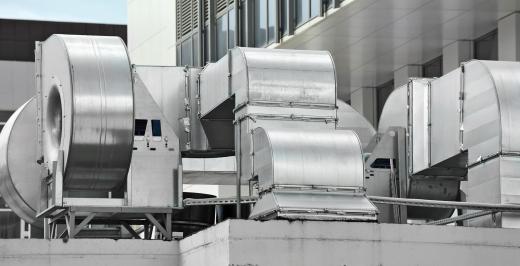A split air conditioning unit is one that has the two main components separate from each other, with one being inside the building, and the other being outside. A central air conditioning unit is nearly always a split unit. There are also air conditioning units called mini split air conditioners. These units operate in a very similar way, but do not use ducts to send the air. These may provide single room air conditioning, or cooling for multiple rooms, and are often called ductless air conditioning units.
The two main components of a split air conditioning system have different functions. The unit situated outdoors, called a compressor, cools the air and handles condensation. This saves the trouble of having to find a way to drain the water created from the air conditioning process indoors. The inside unit, called the blower, is responsible for distributing the air to the rest of the house. This is done through a forced-air system, usually using a fan and a series of ducts that distribute cool air to each room in the home with a vent. An intake vent will return air to the unit.

For those who live in homes without ducts, or who feel they do not need to cool every room, a mini split air conditioning system may be an option. This is much simpler than trying to install the duct work for a traditional split air conditioning unit. There is no need to worry about running ducts, or substantially cutting into walls. These units tend to run more efficiently than window air conditioners, but they do cost more to buy initially.
A miniature system works by installing an air handling piece in the room of choice. Two lines are then connected to an outside unit. While this will require drilling through an outside wall, it will not require the cutting needed for air conditioning units with ducts. One line will deliver coolant to the inside component. The other line will take away condensation. For those who need multiple rooms cooled, several inside components can be installed to one outdoor component.
No matter which type of split air conditioning unit is chosen, it is important to make sure you are choosing a unit that is capable of handling the needs of your home. For those who need replacement units, if the other unit worked adequately, buying one of similar capacity is all you need to do. There are also online calculators to help homeowners choose the right unit. Units that are too powerful will cut on and off too much, thus possibly leading to humidity problems. Units not powerful enough will always be on, and run the risk of burning out, or at least using more electricity than they need to.
